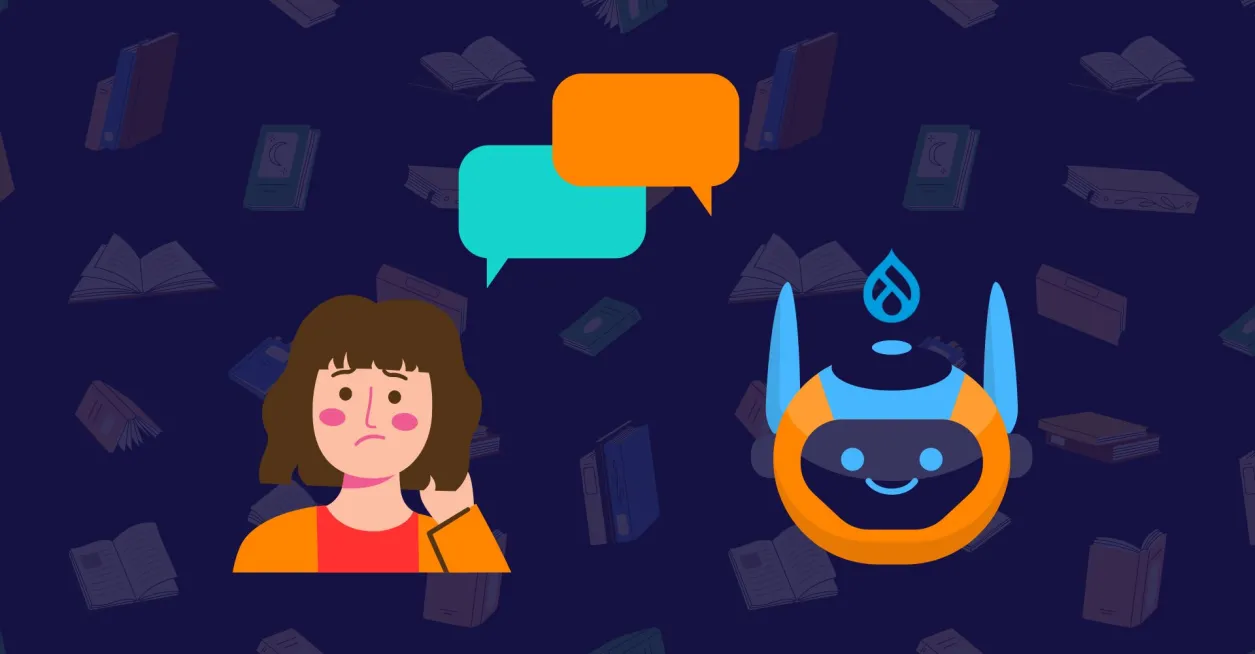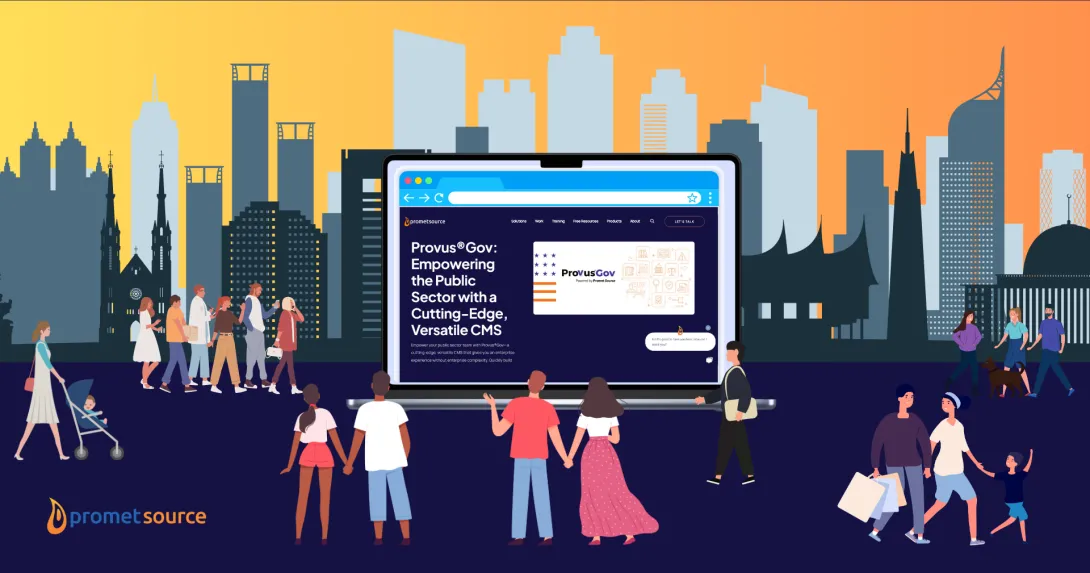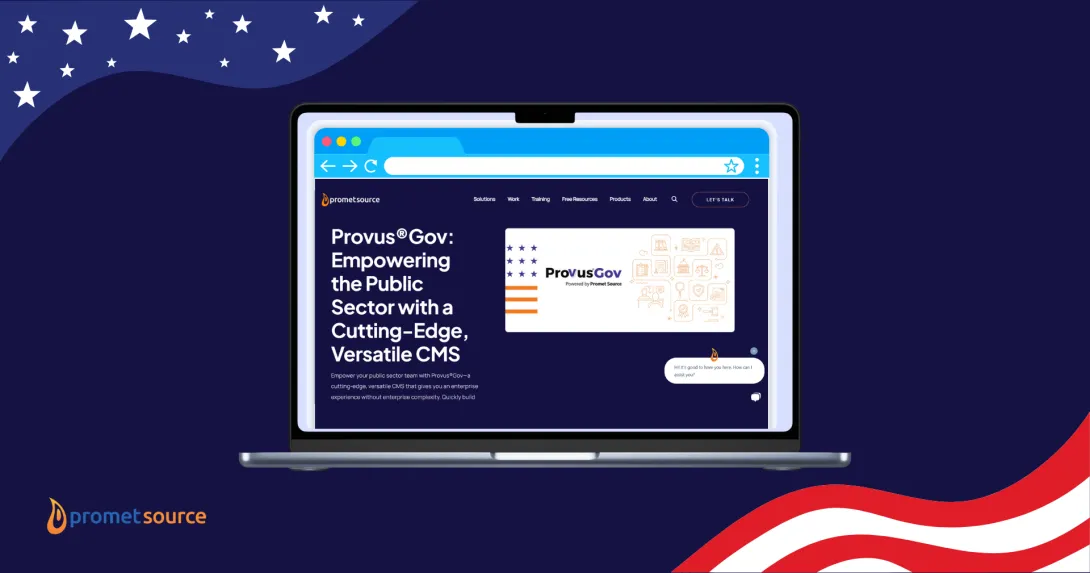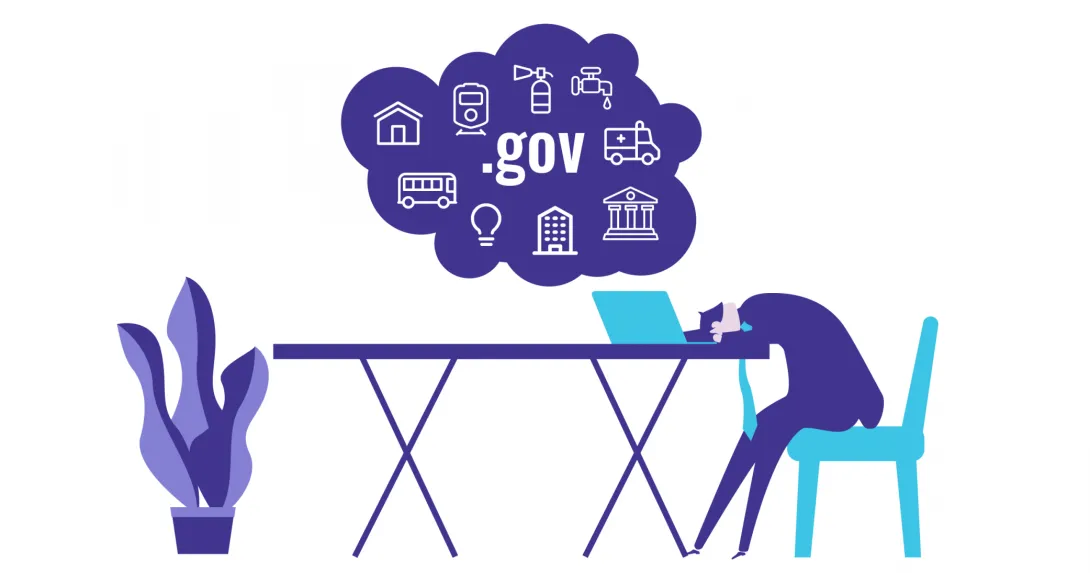Drupal4Gov Webinar: Implementing LLM Search for Local Government

Table of Contents
Takeaway: AI and LLMs have significant potential in making user experience better for government constituents, so in the April 18 webinar with Drupal4Gov, we share our journey of developing a conversational search chatbot for the Martin County Library System, powered by LLMs and seamlessly integrated with Drupal.
Watch the webinar here:
See Josh’s presentation: PromethIA MC Conversational Search Webinar Drupal4Gov
SEE CIVIC AI NAVIGATOR IN ACTION
About the Drupal4Gov webinar
At Promet Source, we are passionate about exploring the latest innovations in technology and understanding how they can be leveraged to enhance user experiences. As Drupal experts and long-time supporters of the Drupal community, we were excited to present our findings on conversational search AI and its potential to revolutionize user interactions during the April Drupal4Gov webinar.

Our presentation, led by myself, Andy Kucharski, President of Promet Source, and Josh Estep, Senior Drupal Developer, aimed to provide insights into the fascinating world of large language models (LLMs) and their applications in creating AI-powered chatbot solutions.
Throughout the webinar, we shared our journey of building a conversational search bot for one of our clients, the Martin County Library System. We discussed the considerations, approach, and strategies involved in developing a chatbot that could understand user queries and provide accurate, relevant information by leveraging the power of LLMs and Drupal's robust content management capabilities.

We also delved into the technical aspects of the project, including the architecture and development process, and how we addressed challenges such as dealing with hallucinations to ensure a reliable and engaging user experience.
One of the highlights of the presentation was a live demo of the chatbot, showcasing its ability to understand and respond to user questions in a natural, conversational manner. The demo provided an opportunity for the audience to interact with the chatbot and experience firsthand how AI for government can transform the way users access information on their websites.
We will take a closer look at the key topics covered during the webinar, share insights from our experience building the conversational search bot, and explore the potential of AI and LLMs in enhancing user interactions within the Drupal ecosystem and beyond.
The rise of LLMs and AI
In recent years, the emergence of LLMs has revolutionized the field of AI and opened up new possibilities for enhancing user experiences across various domains, including search.
LLMs, such as ChatGPT and Claude, are AI systems trained on vast amounts of text data, enabling them to understand and generate human-like language with remarkable accuracy and contextual awareness.
What is LLM in search?
LLMs can be integrated into search systems to provide users with more natural, conversational interfaces for accessing information. Through LLMs, search features in websites can better understand user queries, even when expressed in natural language, and provide more relevant and accurate results.
This integration of LLMs in search marks a significant shift from traditional keyword-based search towards a more intuitive and user-friendly approach.
Examining the capabilities and potential of LLMs like ChatGPT and Claude
These models have demonstrated remarkable performance on various standard tests, exhibiting human-level capabilities in tasks such as language understanding, question-answering, and even coding.

As these models continue to advance at a rapid pace, with new versions and improvements being released regularly, the potential applications for LLMs in search and beyond are exciting.
Our journey into AI integration
As AI systems become more adept at understanding and generating human-like language, they have the potential to transform various aspects of our lives, from how we access information and interact with technology, to how we communicate and collaborate with others.

LLMs can help automate tasks, provide intelligent assistance, and enable more personalized and efficient experiences across a wide range of industries and domains.
At Promet Source, we have been exploring the potential of AI and LLMs in enhancing the user experience within the Drupal ecosystem. Our team has been experimenting with integrating AI capabilities into various aspects of our work, from automating tasks and improving communication, to building modules like Metatag AI and chatbots like Civic AI Navigator (formerly Promethia).

By staying at the forefront of these technological advancements, we deliver cutting-edge solutions that empower our clients and their users with more intuitive, efficient, and engaging digital experiences.
Building a conversational search chatbot for Martin County Library System
We recently had the opportunity to work with the Martin County Library System in Florida to develop a cutting-edge conversational search bot.
The goal of this project was to create an AI-powered chatbot that could understand and respond to user queries about the library system, providing constituents with quick and easy access to the information they need.
One of the key considerations in building this chatbot was to ensure that it remained focused on providing relevant, library-specific information. We wanted the chatbot to be able to handle common questions like "When does the library open?" or "How do I get a library card?" while avoiding off-topic inquiries that could lead to irrelevant or inaccurate responses.
Benefits of an AI-powered chatbot compared to traditional search functionality
The potential benefits of an AI-powered chatbot for enhancing the user experience and improving information accessibility are significant.
- The chatbot can understand user queries expressed in everyday language and provide accurate, targeted responses.
- The conversational interface is more intuitive and user-friendly than traditional search, which often requires users to navigate through complex menus or sift through long lists of search results.
- It can help reduce the burden on library staff by automatically handling a large volume of common inquiries, freeing up staff time and resources to focus on more complex tasks and provide higher-level support to library patrons.
Handling challenges like hallucinations and safeguarding against inappropriate use
One of the primary concerns is dealing with hallucinations—instances where the chatbot generates inaccurate, irrelevant, or nonsensical responses. To mitigate this issue, we employed a range of techniques:
- Prompt engineering
- Integrating with Solr search for more context
- Providing conditional additional instructions
- Iterative testing and refinement
Throughout the development process, we worked closely with the Martin County Library System to understand their specific needs and requirements, iterating on the chatbot's design and functionality to create a solution that met their goals and exceeded their expectations.
The end result is a powerful, AI-driven conversational search bot that is set to transform the way library patrons access information and interact with the library's digital resources.
In the following sections, we'll discuss the overview of the technical architecture and development process behind this chatbot solution, as well as explore the potential future developments and applications of AI and LLMs in the Drupal ecosystem and beyond.
Overview of the technical architecture and development process

To make the chatbot a reality, we architected custom Drupal modules specifically designed to support its AI functionality:
- Prometheus Core
- Prometheus Chatbot
These modules handled key aspects like data integration, ensuring the chatbot had access to the most up-to-date content from the Drupal site.
They also tackled prompt engineering, which involves crafting the right instructions and context for the LLM to generate accurate and relevant responses.
Handling extended conversations and optimizing performance were also crucial considerations in the development process.
Drupal's role in integrating AI and LLM technologies for a chatbot solution
Drupal serves as the foundation and central hub for the chatbot. It's where all the content lives and powers the search functionality.
We knew we needed to leverage Drupal's robust content management capabilities and integrate them seamlessly with the AI and LLM components.
Ensuring the integration of AI technologies maintains performance, accessibility, and user experience
One of the biggest challenges we faced was figuring out how to ensure that the integration of AI technologies within Drupal's architectural framework maintained high performance, accessibility, and user experience standards.
We didn't want the chatbot to slow down the site or create any barriers for users.
To tackle this, we used two main optimization techniques:
- Solr, to quickly retrieve relevant content from the Drupal site and feed it into the LLM.
- Caching mechanisms, to store frequently asked questions and their answers, reducing the need for redundant processing.
Prompt engineering and refining the chatbot's behavior
Another key aspect of the development process was prompt engineering. This involves carefully designing the prompts and instructions that are fed into the LLM, essentially teaching it how to understand and respond to user queries in the context of the library system.
We had to strike a balance between providing enough context for the LLM to generate accurate responses, while also keeping the prompts concise and efficient to maintain fast response times.
In the end, we were able to successfully architect a chatbot solution that leveraged the power of Drupal, Solr, and advanced AI and LLM technologies to create a seamless, intuitive, and highly effective conversational search experience for library patrons.
Live demo and Q&A
One of the most exciting parts of our webinar was the live demo of the conversational search bot in action. We wanted to give attendees a firsthand look at how the chatbot works and how it can transform the way users interact with the library system's digital resources.
Highlights from the live demo of the chatbot

During the demo, Josh walked through a series of real-world scenarios, showcasing the chatbot's ability to understand and respond to user queries in a natural, conversational way.
He demonstrated how the chatbot could handle a wide range of questions, from simple inquiries about library hours and locations to more complex topics like how to access specific resources or services.
What really stood out during the demo was the chatbot's ability to provide accurate, relevant, and contextually appropriate responses.
By leveraging the power of LLMs and the carefully crafted prompts and instructions we developed through prompt engineering, the chatbot was able to engage in fluid, intelligent conversations that closely mimicked human interaction.
Another highlight of the demo was the chatbot's multilingual capabilities. We showed how the chatbot could seamlessly switch between English and Spanish, providing answers in the user's preferred language.

This was a testament to the flexibility and adaptability of the AI and LLM technologies we employed, as well as the robustness of our Drupal-based architecture.
Throughout the demo, we also showcased some of the chatbot's more advanced features, such as its ability to provide contextually relevant links and resources based on the user's queries.
This demonstrated how the chatbot could not only provide answers, but also guide users to additional information and services available through the library system.
Key insights from the Q&A session
Some of the key themes that emerged during the Q&A session included:
- The importance of adding safeguards and using the filtering system to ensure the chatbot doesn’t respond to inappropriate or profane conversations.
- The potential for AI and LLMs to revolutionize the way we think about user experience and information architecture in the Drupal ecosystem and beyond.
- The need for ongoing training, monitoring, and refinement of chatbot responses to ensure accuracy, relevance, and alignment with organizational goals and values.
Throughout the Q&A session, we were struck by the enthusiasm and curiosity of the attendees. It was clear that the demo had sparked a lot of interest and excitement about the possibilities of conversational search and AI-powered chatbots, and we were thrilled to be able to share our experiences and insights with the community.
Future developments and possibilities
It's clear that the integration of AI and LLMs into Drupal-based projects is just the beginning of a much larger transformation. The success of our conversational search bot project with the Martin County Library System has opened up a world of possibilities for government sites to better constituent experiences.
Scaling and integrating
Looking ahead, there are numerous exciting prospects for the chatbot's future development. One of the most promising is scaling the chatbot to handle the entire county's content, not just the library system.
By expanding the scope of the chatbot's knowledge base and training it on a wider range of content and services, we could create a comprehensive, county-wide conversational interface that serves as a central hub for information, resources, and support.
Some specific areas where we see potential for future development and collaboration include:
- Integration with voice assistants such as Google Assistant, Alexa, and Siri
- Enhanced accessibility and multilingual support
Recap of main points and lessons learned
As we reflect on the key takeaways and lessons learned from our conversational search bot project with the Martin County Library System, a few things become clear:
- The integration of AI and LLMs into Drupal-based projects represents a major shift in the way we think about user experience, information architecture, and digital engagement.
- The potential benefits of AI-powered chatbots are vast, from improving information accessibility and reducing staff workload to enabling more personalized, intuitive, and engaging user experiences.
- Successful implementation of AI and LLM technologies requires a deep understanding of the technical considerations, such as data integration and prompt engineering, of these powerful tools.
Bring a better user experience to your community through an AI-powered search chatbot
Ready to take the next step and start integrating AI and LLM technologies into your own Drupal projects? We're here to help. Request a free demo of Civic AI Navigator and see for yourself how it can help your constituents.
Get our newsletter
Get weekly Drupal and AI technology advancement news, pro tips, ideas, insights, and more.





